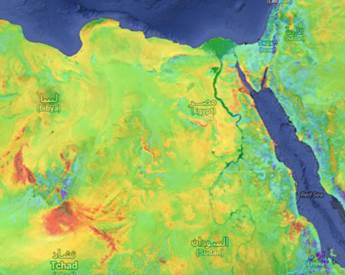An inclusive plan for energy subsidy reform is to be implemented within five years and includes protecting the poor, said Egyptian President Abdel-Fattah El-Sisi at the World Future Energy Summit (WEFS) in Abu Dhabi on Monday.
The president travelled to the United Arab Emirates on Sunday for a two-day trip to attend the summit and meet UAE officials.
“The availability of energy and managing the demand for it is one of the main priorities on the Egyptian development agenda,” El-Sisi said.
El-Sisi stated that the limitations of traditional energy resources necessitate using renewable sources of energy, solar and wind, with plans for renewable sources to represent 20 percent of Egyptian energy production by 2020.
He called upon the attendees to participate in the Economic Development Conference in Sharm El-Sheikh in March.
The president also received the Sheikh Zayed Energy of the Future Award.
“Egypt works on developing a national strategy for energy that fulfils the needs of the local market and achieves the targeted growth rates for the national economy. It must also secure its power supply, and protect the environment and be sustainable,” he announced.
El-Sisi specified that Egypt’s energy development programme includes producing 4300 megawatts from power plants that produce electricity from solar and wind energy within the next three years.
Solar energy represents only one percent of Egypt’s production of electricity, according to a report by the State Accountability Authority that was sent recently to the presidency and to the prime minister’s office, reported Aswat Masriya.
Egypt’s first solar-powered gas station, which belongs to the national distributor of petroleum products Misr Petroleum, started operating in downtown Cairo in September 2014.
El-Sisi explained at the summit that the energy strategy includes diversifying the traditional sources of energy used in power plants through a balanced and sustainable combination, including clean usage of coal, nuclear energy sources, as well as natural gas and oil.
Since July 2013, following the ouster of Islamist president Mohamed Morsi, Egypt has received a total of $10.6 billion in aid from three Gulf States, UAE, Saudi Arabia and Kuwait, most of which came in the form of petroleum products.
Egypt and China made plans in December to cooperate in the energy sector, particularly when it comes to the construction of coal-powered power plants.
Egypt’s government is looking for alternatives to natural gas and mazut to power its plants and factories as production of domestic natural gas fields has diminished over recent years while production from new fields was halted due to political unrest.
El-Sisi also talked in his speech about “transforming Egypt into a pivotal centre for commerce and circulation of energy, making use of its geographical location between the biggest producers and consumers of energy, with the presence of infrastructure, especially the Suez Canal, the most important waterway, with its new extension.”
A waterway is being dug alongside the Suez Canal, a project that was inaugurated in August 2014 and is to be finished by mid-2015, according to an announcement by the president in August.
The new artificial waterway will be 72 km in length at a cost of $4 billion.
In his speech, El-Sisi called upon the private sector to participate in realising these projects, the elements of attraction being “the stability of the energy market, the availability of information, the fact that there aren’t many dangers, as well as working with criteria and specifications, and separating transportation, production and distribution.”
He mentioned that Egypt is working on new legislation to encourage the production of electricity from renewable energy.
The Egyptian president also stressed that “Egypt considers the security of the Arab Gulf region a red line and a part of its national security,” adding that terrorism is a world phenomenon that spreads its dangers across societies.
He called upon the international community to face terrorist acts not just with security and military solutions, but also developmental solutions on the economic and social levels, as well as the cultural sides “that includes the renewal of the religious discourse and purifying it from any erroneous ideas that lures some into using violence to express opinions or impose orientations.”





